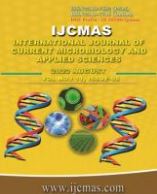


 National Academy of Agricultural Sciences (NAAS)
National Academy of Agricultural Sciences (NAAS)

|
PRINT ISSN : 2319-7692
Online ISSN : 2319-7706 Issues : 12 per year Publisher : Excellent Publishers Email : editorijcmas@gmail.com / submit@ijcmas.com Editor-in-chief: Dr.M.Prakash Index Copernicus ICV 2018: 95.39 NAAS RATING 2020: 5.38 |
Medicinal plants have been used as herbal remedies against many infectious diseases throughout the history of mankind. They contain secondary metabolites which have great therapeutic potential in the treatment of diseases. This study was carried out to investigate the antimicrobial activity of Sida acuta leave extract against Staphylococcus aureus and Escherichia coli isolated from urinary tract infections. The ethanol, methanol and chloroform extracts of Sida acuta leaves were prepared using cold extraction method. Antimicrobial sensitivity test was carried out on the different extracts using Agar-well diffusion method. The zones of inhibition were measured after 24 hours incubation. The results obtained from the study showed that the ethanol extract had more inhibitory activity on S. aureus with 24mm as the zone of inhibition at the concentration of 200mg/ml and a lower inhibitory effect on E. coli with 19mm as the zone of inhibition at the same concentration. Also, the methanol extract (21mm at 200mg/ml) and chloroform extract (19mm at 200mg/ml) had lower inhibitory effect on S. aureus with 20mm as the zone of inhibition and 19mm as the zone of inhibition on E. coli at the same concentration. The MIC of the ethanol, methanol and chloroform extracts of Sida acuta leave were determined using the broth dilution method. The MIC of the ethanol and methanol extracts on the test organisms were 12.5 mg/ml and 25mg/ml on S. aureus and E. coli respectively while the MBC of the extracts ranged between 12.5mg/ml and 100mg/ml respectively. The chloroform extracts showed no bactericidal effect on the test organisms. The phytochemical analysis carried out on the plant extracts showed the presence of alkaloids, tannins, flavonoids, saponins, steroids and terpanoids. These secondary metabolites are responsible for the antimicrobial activities which aids in the treatment of diseases. This study therefore encourages the use of this plant extract in the treatment of human diseases caused by the test organisms.
 |
 |
 |
 |
 |